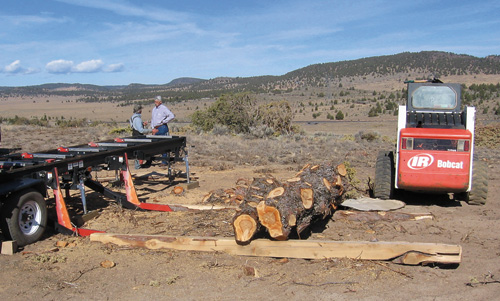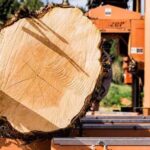 Oregon’s Western Juniper gets a bad rap. Although it’s a native species, juniper forests have spread uncontrollably in the central and eastern parts of the state, threatening sage grouse habitat and sucking the water table dry.
Oregon’s Western Juniper gets a bad rap. Although it’s a native species, juniper forests have spread uncontrollably in the central and eastern parts of the state, threatening sage grouse habitat and sucking the water table dry.
BY LINDA BAKER
 |
LaBrecque talks to Harney County commissioner Dan Nichols while harvesting juniper just north of Burns.// Photo by Peter Dalke |
Oregon’s Western Juniper gets a bad rap. Although it’s a native species, juniper forests have spread uncontrollably in the central and eastern parts of the state, threatening sage grouse habitat and sucking the water table dry. In the 1930s, Oregon had about 1.5 million acres of juniper forests. Today it’s at more than 6.5 million.
Enter Gerard Joseph LaBrecque, a 62-year-old Burns resident who had been using juniper in his heirloom furniture business, Creations by Joseph, since the mid-1990s. When public agencies stepped up efforts to combat the invasive tree — and when the housing collapse eroded the furniture market — LaBrecque saw an opportunity to diversify and restore juniper’s good name. In 2010 he applied for funding through Harney County’s Title III program, bought a custom-built portable mill for $28,000 and in, May 2011, launched Joseph’s Juniper, a juniper reclamation and lumber business.
LaBrecque goes into the woods, cuts down the juniper, then mills a wide variety of materials on site, producing everything from firewood to lumber suitable for landscaping, fencing and decking. Last year he processed 800 acres of juniper and grossed about $300,000. He employs five people and says he could use five more. “Production needs to be up because demand is getting stronger and stronger by the week, by the year.”
LaBrecque, whose customers include Sustainable Northwest Wood in Portland and Parr Lumber in Burns, says his products appeal to people who want an organic alternative to chemically treated railroad ties and posts typically used in landscaping projects. Juniper is also known for its natural rot resistance. There are other reasons Joseph’s Juniper is growing: The USDA’s Natural Resource Conservation Service gives money to private ranchers to eliminate juniper, who then subcontract with LaBrecque. And in August, Oregon Solutions, a statewide group focused on sustainable community solutions, created a team focused on the industry potential of the reclaimed wood.
Juniper is often considered “public enemy No. 1,” LeBrecque says. “Here I am, making a living out of it.”



